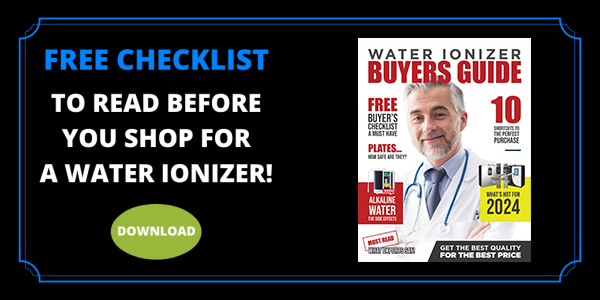Choosing a Water Ionizer
How To Choose A Water Ionizer
Water ionizer prices vary widely – as do claims made by some of the water ionizer companies. With all of the information, spin and hype out there, how do you decide which water ionizer is right for you?
It’s not a daunting a challenge as it may seem. With a little basic information, you should have no problem choosing a water ionizer that will produce water with pH at the levels you need for years to come.
Forget What You’ve Been Told
If you have read or been told that only this water ionizer or that water ionizer will produce alkaline water that offers health benefits you have been misinformed. If you have read or been told that plates in certain brands of water ionizers will disintegrate, melt or “fall apart” in any way, that is also misinformation. If you have read or been told that certain water ionizers leach titanium into the water which is toxic, toss that out with the first two statements.
The basic fact is that all water ionizers use the same basic technology to produce the same thing. Every water ionizer will have an electrolysis chamber containing industry standard platinum-coated titanium plates. Every water ionizer sends electricity to those plates to give the water an electrical charge while in it passes through the electrolysis chamber, thereby “ionizing” it.
The level of ionization – which dictates the pH of the water being produced – is based on the amount of power delivered through the plates. Stronger pH levels are produces with stronger settings are selected on the control panel which tells the unit to send more water to the plates to create a stronger charge.
Considerations When Choosing
Your first consideration is affordability. Decide what you are comfortable spending on the technology. Consider long-term cost. You may be willing to pay more when you think about what you will no longer be spending on bottled water. Find a price range you’re comfortable working within and then start looking at water ionizers that fit your budget.
Next, consider usability. Ease of use and adjustability is important. You want something that will be easy for all members of the family to use on a daily basis. Choosing a model that allows you to micro-adjust the power settings within each preset is recommended as well – source water varies throughout the year – and if you move or have a “summer/winter home” the source water there may be different. The ability to micro-adjust the power settings within the presets of your water ionizer will help ensure consistent delivery of pH levels any time of year, wherever you may be.
Warranty is another important consideration. The industry standard is five years covering both parts and labor. Many companies offer warranties that go beyond the industry standard. A few will only offer a one or three year warranty. Some will stand behind their products covering both parts and labor for as long as you own their product. If you are looking at spending over $2,000 for your water ionizer you should consider sticking with a company that respects that investment with a longer warranty.
Finally, consider how the product is going to look sitting on your counter – or mounted on your sink if you are considering an under-counter model. Looks do matter. You’re going to have to look at your water ionizer every day. You want something that either blends in well with your kitchen décor or, at the very least, doesn’t stand out like a sore thumb – or misplaced appliance.
One more note – check on installation options. While most counter top water ionizers are designed to connect directly to the faucet, many models also allow for direct connection to the cold water line below the sink. If you’ve got a busy household with a lot of people using the sink, the ability to plumb the water supply directly to the cold water line is a big benefit.
With this type of installation, the water ionizer will still sit on your counter but rather than having a diverter hanging off of your faucet with a hose running to the unit, the water supply hose will run down below the sink to connect to the cold water line. You’ll need a small hole – just over ¼” in diameter at least – in order to run the line down for this type of connection. And you’ll also need an additional part – which sells for about $20 + shipping, but the convenience of having your water ionizer operate independently of the faucet – just like every other appliance in your home – is worth the extra effort and expense.
Choosing a water ionizer is easy – don’t be mislead by hype or scare tactics. Find the water ionizer that looks right, feels right, is priced right and has the options you want – then go for it. Most companies offer a 30 to 60-day money back guaranty.
